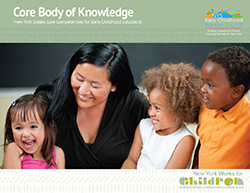
Core Body of Knowledge
New York State's Core Competencies for Early Childhood Educators

2.2
Resources for Competency 2.2:
click to view resource list
Communication with Families
The professional working with young children communicates regularly, respectfully, and effectively with families
Resources & Media for Understanding Competency 2.2
Behaviors & Skills
-
aShares and discusses the program's philosophy about provider/family relationships with families on a regular basis
-
bIs accessible and easy to reach
-
cCommunicates clear and complete information in a manner that matches the family's style, preferred language, level of understanding, and preferred means of communication
-
dCommunicates to and about families in a positive way
-
eCommunicates regularly with families; to share the accomplishments of the child, to answer questions, and to discuss routines, activities and progress
-
fTalks with families about their lives, work, parenting, problems, etc.
-
gFollows rules regarding confidentiality
-
hUses tools like communication journals as well as technology to share information with parents and for parents to share information about how children are doing at home
-
iUses surveys to elicit information and feedback from families
-
jListens to families' questions and responds honestly with accurate information
-
kSolicits information from families about what "works" for them so that they can consider implementing those suggestions in their classroom or program
-
lUses an interpreter when necessary to ensure clear communication with families
-
mSeeks input and collaboration from fathers, as well as from mothers or other caregivers
-
nWhen appropriate, communicates the possibility of a developmental delay or special need sensitively and confidentially, providing documentation and explanation for the concern, and suggesting next steps and information about resources for assessment
